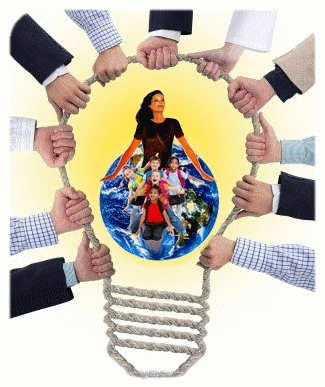
contributes to the best
development and to the happiness of our grand "human House",
and this in the continuation of its original historical source (the Ionian philosophic school,
initiated by Thales and -even more- by Anaximander, then by their heirs,
Heraclitus, Parmenides, Democritus, Leucippus, Pythagoras, Epicurus, Aristotle, etc, relayed by many others in the
course of the centuries) where
the natural world, the human fact, and the sciences, were conceived as a
globally complementary and interdependent whole, useful for the permanent human
progress. Even further, this source had Indo-European origins, Vedic,
typical of the important socio-cultural transition of the Neolithic.
In the modern time, after
the western classical
Humanism confined itself in vain to search the place and the best possible quality of
the human Being,
Eco-humanism has continued to be the philosophy, the science, and the politics, of the best possible development of the human House, that is to say of the human whole in construction in its environment of life,
societal and natural. What includes and associates the concepts of human Being,
human family, human species, human City, Humanity, as well as the elements,
organisms, and structures, with which
they are in profitable symbiosis and synergy.
Etymologically, this concept of house (o´kos) defines an entity, protecting in
a way as long-lasting as possible the common life of the members of a same family and their
commensals in their living environment, by including at the same time the
container (the constructed structure) and the contents (the beings and the goods) of this entity.
For its part, the eco-humanist
notion of human House
(the common house of the grand human family) overlays such a conceptual field, at the most of its integrative
capacity, and in a proactive, pragmatic, and cohesive approach.
In these conditions,
Eco-humanism is at the same time a transcultural and a metacultural current. It is
transcultural because it meets the main local cultures, strengthening
there with the best models of general interest, but without stopping or
merging in such or such of them; and it is metacultural because
it continues beyond these cultures to develop always better in the service of the
human whole (the meta prefix qualifies a continuation in an upper evolutionary process).
So, Eco-humanism has
for goal the improvement of the global composite human
compound, in
optimal development in its
natural (external) and societal (internal and endogenous)
environment. Fuelled by its deep conceptual basis, this
driving current leads in this direction to build, to protect, and to project,
together, the best of the human Being
(the fundamental unit) and the best of the human House (the whole integrator),
each part of these entities beeing not able to build itself and to prosper
without the other one.
To better succeed in all of
that, modern Eco-humanism uses a
principial corpus and a
pragmatic organization, auto-corrected according to
the evolutionary necessities.
What means
in practice :
 ●
"One for all and all for one" : Eco-humanism
transmits us a desire for interacting better and better, in our society and in our environment, to get our
own happiness by contributing also to the protection and to the
best development of
our big
human family, which can and which must
●
"One for all and all for one" : Eco-humanism
transmits us a desire for interacting better and better, in our society and in our environment, to get our
own happiness by contributing also to the protection and to the
best development of
our big
human family, which can and which must protect us in return.
All this is interdependent.
protect us in return.
All this is interdependent.
●
To help us to manage well our society and our environment, Eco-humanism is an educational guide of
our consciousness, to which it brings essential guiding marks, and a big interior strength.
This guide results from a metacultural heritage passed on and improved
generation after generation for a very long time, in a logic of pragmatic and prospective adaptation
to the real world.
 ●
Finally,
Eco-humanism is a
tool of
sociocultural improvement which, by a proactive correction and a permanent adaptation, improves the cohesion and the intelligence of
Humanity, benefiting as much our evolutionary strength as our happiness,
in a win-win synergy.
●
Finally,
Eco-humanism is a
tool of
sociocultural improvement which, by a proactive correction and a permanent adaptation, improves the cohesion and the intelligence of
Humanity, benefiting as much our evolutionary strength as our happiness,
in a win-win synergy.
It results from all this that
- Eco-humanism is a philosophy and a science.
It is a philosophy as far as it produces a
questioning, a reflection, and an interpretation, on the human existence,
development, and environment, and on the knowledges and concepts used for that.
It is a science as far as it uses and improves all
the learnt knowledges, considered as true by their relations as objective
and verifiable as possible with reality.
- Eco-humanism
is, furthermore, a way of civical, then political, involvement,
which incites to act concretely and permanently in
the general interest of Humanity, this guaranteeing also and by consequence the respect and the happiness of every Human being
in the common societal organization.
back
to main page

www.marc-carl.net